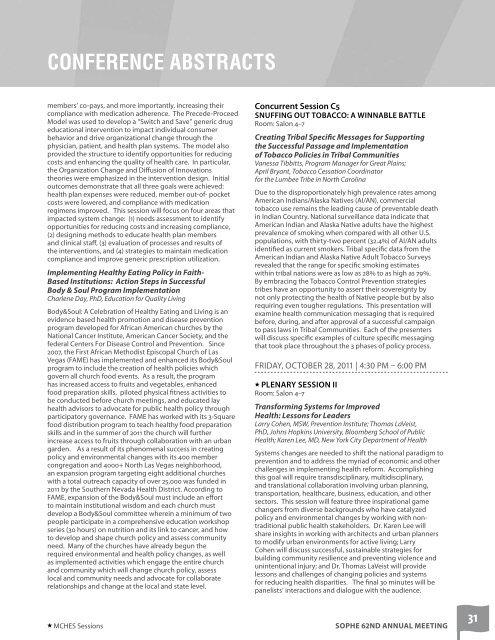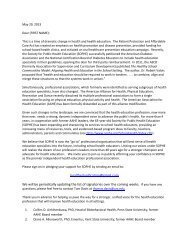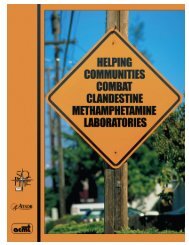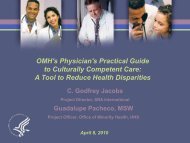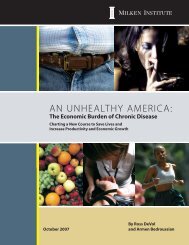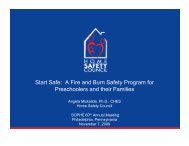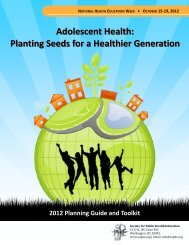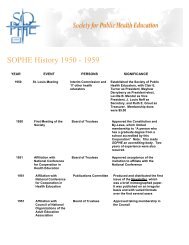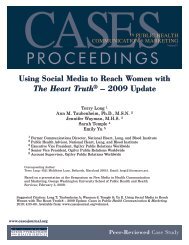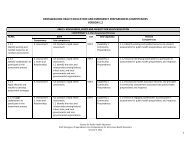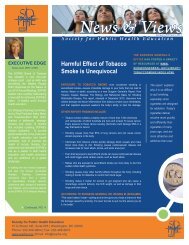Download - Society for Public Health Education
Download - Society for Public Health Education
Download - Society for Public Health Education
- No tags were found...
You also want an ePaper? Increase the reach of your titles
YUMPU automatically turns print PDFs into web optimized ePapers that Google loves.
Conference Abstractsmembers’ co-pays, and more importantly, increasing theircompliance with medication adherence. The Precede-ProceedModel was used to develop a “Switch and Save” generic drugeducational intervention to impact individual consumerbehavior and drive organizational change through thephysician, patient, and health plan systems. The model alsoprovided the structure to identify opportunities <strong>for</strong> reducingcosts and enhancing the quality of health care. In particular,the Organization Change and Diffusion of Innovationstheories were emphasized in the intervention design. Initialoutcomes demonstrate that all three goals were achieved:health plan expenses were reduced, member out-of- pocketcosts were lowered, and compliance with medicationregimens improved. This session will focus on four areas thatimpacted system change: (1) needs assessment to identifyopportunities <strong>for</strong> reducing costs and increasing compliance,(2) designing methods to educate health plan membersand clinical staff, (3) evaluation of processes and results ofthe interventions, and (4) strategies to maintain medicationcompliance and improve generic prescription utilization.Implementing <strong>Health</strong>y Eating Policy in Faith-Based Institutions: Action Steps in SuccessfulBody & Soul Program ImplementationCharlene Day, PhD, <strong>Education</strong> <strong>for</strong> Quality LivingBody&Soul: A Celebration of <strong>Health</strong>y Eating and Living is anevidence based health promotion and disease preventionprogram developed <strong>for</strong> African American churches by theNational Cancer Institute, American Cancer <strong>Society</strong>, and thefederal Centers For Disease Control and Prevention. Since2007, the First African Methodist Episcopal Church of LasVegas (FAME) has implemented and enhanced its Body&Soulprogram to include the creation of health policies whichgovern all church food events. As a result, the programhas increased access to fruits and vegetables, enhancedfood preparation skills, piloted physical fitness activities tobe conducted be<strong>for</strong>e church meetings, and educated layhealth advisors to advocate <strong>for</strong> public health policy throughparticipatory governance. FAME has worked with its 3-Squarefood distribution program to teach healthy food preparationskills and in the summer of 2011 the church will furtherincrease access to fruits through collaboration with an urbangarden. As a result of its phenomenal success in creatingpolicy and environmental changes with its 400 membercongregation and 4000+ North Las Vegas neighborhood,an expansion program targeting eight additional churcheswith a total outreach capacity of over 25,000 was funded in2011 by the Southern Nevada <strong>Health</strong> District. According toFAME, expansion of the Body&Soul must include an ef<strong>for</strong>tto maintain institutional wisdom and each church mustdevelop a Body&Soul committee wherein a minimum of twopeople participate in a comprehensive education workshopseries (30 hours) on nutrition and its link to cancer, and howto develop and shape church policy and assess communityneed. Many of the churches have already begun therequired environmental and health policy changes, as wellas implemented activities which engage the entire churchand community which will change church policy, assesslocal and community needs and advocate <strong>for</strong> collaboraterelationships and change at the local and state level.MCHES SessionsConcurrent Session C5Snuffing Out Tobacco: A Winnable BattleRoom: Salon 4–7Creating Tribal Specific Messages <strong>for</strong> Supportingthe Successful Passage and Implementationof Tobacco Policies in Tribal CommunitiesVanessa Tibbitts, Program Manager <strong>for</strong> Great Plains;April Bryant, Tobacco Cessation Coordinator<strong>for</strong> the Lumbee Tribe in North CarolinaDue to the disproportionately high prevalence rates amongAmerican Indians/Alaska Natives (AI/AN), commercialtobacco use remains the leading cause of preventable deathin Indian Country. National surveillance data indicate thatAmerican Indian and Alaska Native adults have the highestprevalence of smoking when compared with all other U.S.populations, with thirty-two percent (32.4%) of AI/AN adultsidentified as current smokers. Tribal specific data from theAmerican Indian and Alaska Native Adult Tobacco Surveysrevealed that the range <strong>for</strong> specific smoking estimateswithin tribal nations were as low as 28% to as high as 79%.By embracing the Tobacco Control Prevention strategiestribes have an opportunity to assert their sovereignty bynot only protecting the health of Native people but by alsorequiring even tougher regulations. This presentation willexamine health communication messaging that is requiredbe<strong>for</strong>e, during, and after approval of a successful campaignto pass laws in Tribal Communities. Each of the presenterswill discuss specific examples of culture specific messagingthat took place throughout the 3 phases of policy process.Friday, October 28, 2011 | 4:30 pm – 6:00 pmPlenary Session IIRoom: Salon 4–7Trans<strong>for</strong>ming Systems <strong>for</strong> Improved<strong>Health</strong>: Lessons <strong>for</strong> LeadersLarry Cohen, MSW, Prevention Institute; Thomas LaVeist,PhD, Johns Hopkins University, Bloomberg School of <strong>Public</strong><strong>Health</strong>; Karen Lee, MD, New York City Department of <strong>Health</strong>Systems changes are needed to shift the national paradigm toprevention and to address the myriad of economic and otherchallenges in implementing health re<strong>for</strong>m. Accomplishingthis goal will require transdisciplinary, multidisciplinary,and translational collaboration involving urban planning,transportation, healthcare, business, education, and othersectors. This session will feature three inspirational gamechangers from diverse backgrounds who have catalyzedpolicy and environmental changes by working with nontraditionalpublic health stakeholders. Dr. Karen Lee willshare insights in working with architects and urban plannersto modify urban environments <strong>for</strong> active living; LarryCohen will discuss successful, sustainable strategies <strong>for</strong>building community resilience and preventing violence andunintentional injury; and Dr. Thomas LaVeist will providelessons and challenges of changing policies and systems<strong>for</strong> reducing health disparities. The final 30 minutes will bepanelists’ interactions and dialogue with the audience.SOPHE 62nd Annual Meeting31


